The blue doors of Sidi Bou Saïd, Tunisia
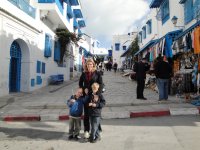 On a trip to Tunisia just before the Arab Spring that swept the region, we took the 20 kilometer train trip north from Tunisia’s fascinating capital of Tunis, to the lovely seaside town of Sidi Bou Saïd. I’ve already written about my penchant for destinations with exotic-sounding names, and this one definitely fit the bill.
On a trip to Tunisia just before the Arab Spring that swept the region, we took the 20 kilometer train trip north from Tunisia’s fascinating capital of Tunis, to the lovely seaside town of Sidi Bou Saïd. I’ve already written about my penchant for destinations with exotic-sounding names, and this one definitely fit the bill.
We were there in winter, but the day was perfect – cool and sunny – and the town, which overflows with tourists in the spring and summer, was wonderfully calm.
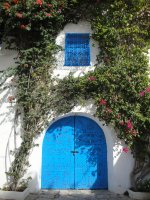 The city is named for a Muslim religious figure, Abou Said ibn Khalef ibn Yahia Ettamini el Beji (1156-1231), who settled in the town on his return journey from a pilgrimage to Mecca.
The city is named for a Muslim religious figure, Abou Said ibn Khalef ibn Yahia Ettamini el Beji (1156-1231), who settled in the town on his return journey from a pilgrimage to Mecca.
During his time here, the town became known as a center for Sufism. After his death in 1231, he was buried there, and the area around his tomb became an important burial ground for other Sufis. The city also took his name.
Soon it was the wealthy residents of nearby Tunis who began to settle in Sidi Bou Saïd during the summer months, hoping to escape the heat of the capital. They built sumptuous summer residents along the cobblestoned streets and narrow alleyways and the blue and white color-scheme that the city is known for today caught on.
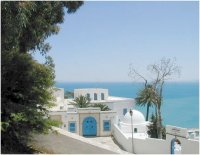 Sidi Bou Saïd is also known as an ‘Artists’ village’ and visitors today will still find many galleries. Numerous Tunisian artists and foreign artists have settled here, at least for some time.
Sidi Bou Saïd is also known as an ‘Artists’ village’ and visitors today will still find many galleries. Numerous Tunisian artists and foreign artists have settled here, at least for some time.
Perhaps the most famous foreign artist to call Sidi Bou Saïd home for a while was the German-Swiss painter Paul Klee (1879-1940), who arrived in 1914 and stayed on. Like many artists, Klee’s paintings were transformed by the influence of the Tunisian light.
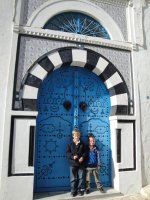 The Café des Nattes was a famous artistic and literary haunt of the 1920s, and photos of its famous patrons still hang on its wall. They include Simone de Beauvoir and Jean-Paul Sartre.
The Café des Nattes was a famous artistic and literary haunt of the 1920s, and photos of its famous patrons still hang on its wall. They include Simone de Beauvoir and Jean-Paul Sartre.
Today it’s a great place to sit in the sun and enjoy a cup of the traditional mint tea with pine nuts – warning: they’re terribly addictive! – as you watch the busy hustle of the crowds below and the blue Mediterranean in the distance.
Something else to watch for on your visit to Sidi Bou Saïd are the beautiful, delicate bird cages, crafted of wood and wire to resemble ornate mausoleums. they are sold throughout the town and hang throughout the twisting streets.
Whether you make it a day trip from Tunis or the destination for a longer visit, enjoy your time in the beautiful Mediterranean coastal town of Sidi Bou Saïd.
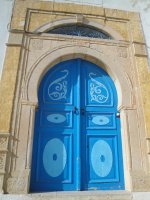
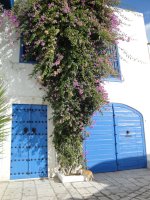
Lovely photos and a very interesting post – i really enjoy visiting Tunesia both business and private visits… 🙂
Yes, it is beautiful! I’d love to get back, but I’ll wait ’til things are a little calmer. Between Tunis and Rome it’s just a one hour flight.
I don’t think I will ever visit this place, so thank you for this beautiful post. Those blue colors are enchanting, Kimberly. You and your family look great.
Thanks, Julia. It really is a pretty place. But never say never. When you come to Italy to trace your roots, it’s only a one hour flight away. : )
I didn’t realise it was so close! Sounds like I’d need to go with an empty suitcase.. Xcat
Ah, yes, Catherine. Literally a hop, skip and a jump. Even from ‘up north’. Yes,you told me you love the souks, so definitely pack an extra bag!
[…] Sidi Bou Said – I’ve already written a post about this adorable Mediterranean seaside town of white buildings and elaborate blue doors. This […]